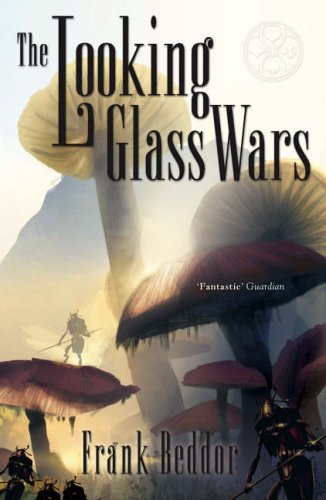 BUY IT AT AMAZON: CLICK HERE!
BUY IT AT AMAZON: CLICK HERE!
AUTHOR: Frank Beddor
PUBLISHER: Egmont
MSRP: N/A for America
PAGES: 376
For many writers, there’s an undeniable lure in remaking an existing property.
The conceit of The Looking Glass Wars is uncomplicated: Alice Liddell, to whom the original
It’s an engaging premise which is never adequately realized in the narrative. Creating an unnecessary distance between reader and narrative are Beddor’s weak characterizations. His characters read as if he had rolled them up for a D&D campaign the night before he started drafting, each identifiable by a single distinguishing characteristic. Alyss is a selfish brat, from beginning to end; her primary foe, Queen Redd, is meant to be violently psychotic, but exists in a dramatic vacuum in which her craziness comes off as humorous. In the original
Much has been made, in other reviews of the book, of Beddor’s knack and penchant for gory violence. Maybe it’s just because we’re CHUD here, but there’s really nothing all that brutal or shocking for an audience who is familiar with, and who delights in, the films of, say, Takashi Miike. The violence seems gratuitous, not having any true characters to anchor it, and merely exists to distance the book from its children-oriented inspiration.
Beddor’s prose style will be familiar to those who read Dan Brown’s The Da Vinci Code; for those blessed few uninitiated, what that means is that each chapter is somewhere in the vicinity of four or five pages, dispensing plot points one at a time. The plot progresses like a horse marching over caltrops, jerking wildly every time its foot encounters the next point.
What this means is that the book will just flow through your hands; it’s got a nice heft, and a good page count, but the chapters fly right by. It shouldn’t take a reader more than a couple of evenings to get through, and, to be fair, part of that is because there’s a terrific momentum to the plot. That metaphorical horse just wants to charge past the obstacles. The story itself will appeal to those fans of the video game American McGee’s Alice; both are reinventions of the familiar story with similar sensibilities, but neither crosses exact conceptual borders with the other.
The central failure of The Looking Glass Wars is that there is nothing in this Wonderland, aside from vaguely familiar names, that suggests it is in fact Carroll’s Wonderland perverted, or vice-versa. Entering into the fiction for just a moment, I have to note that Beddor’s Wonderland is not nearly so engaging a place to spend time than Carroll’s sanitization of Alyss’ story. The result is an unavoidable aura of simple exploitation that surrounds the book. This is a book about action; action that could have well taken place in a world completely of Beddor’s imagining.
Bottom line: This book is a breeze to get through, and about as memorable.
Judging the Book by its Cover
For the trade paperback edition I received, the publisher seems to be trying to distance the book from its heritage, as the only symbol that reminds a reader of Carroll’s novel is that of the giant mushrooms. A more appropriate visual cue would have been the suits of cards (which are featured on the hardcover release), as much more is made of the card factions in The Looking Glass Wars than in the
But, hey, the ‘shrooms are plenty ethereal and freaky.
6 out of 10